Yoga: ultimate compensation or reconciliation tool?

Who doesn't dream of full health? Today, full health is generally considered, at most, temporary. A moment of fullness between two hollows. They say you would have to be really lucky to never get sick. If such a case arises, we envy the ultra-efficient defense system of this extraordinary individual. Our vision of ourselves is anchored in fragility, vulnerability. No one would be safe from omnipresent microbes, nor from the threat of “serious illnesses”. In this context, if we dare to evoke a state where, in addition to the absence of illness and other possible ailments, illness is simply not possible, then we appear to be crazy, or at best, a sweet dreamer.
However, according to the Yoga Sutras of Patanjali, this state is not only possible, but is our natural state. We are made to live in this state of permanent full health.
The disconnection in question
Full health is achieved, Patanjali explains, when all our matter vibrates according to our deep being, our consciousness. Illness and unhappiness occur when there is a disconnection between these two aspects of the human being, matter and the deep being.
What do we mean by our material? We tend to designate as material only what we can touch, feel, see. In this case, our matter would only be our physical body, but in yoga the term “matter” means much more. Our matter is made up of our physical body, of course, but also of our mind, our thoughts, and our emotions.
The yogi's choice
According to Patanjali, our inner being is eternal, pure, a source of comfort, and pure consciousness. However, we also have a temporary, impure aspect, which is a source of discomfort and which has no consciousness: our matter.
This impure, temporary, source of discomfort and devoid of consciousness matter is not made to fend for itself. It is at the service of our pure consciousness, or it is, in any case, in the accomplished human being, the one we could call “yogi”.
This person in whom matter abandons itself to being accesses a source of unlimited wisdom. There is no longer any room in her for illness, doubt, discomfort, because all her matter vibrates according to pure consciousness, which is eternal and a source of comfort.
Alas, most of us have an obstinate, somewhat wild nature that believes it has better things to do than submit to its opposite, being. It is the total confusion between the one who is master, our deep being (“svamisakti” – sutra II.23) and the one who thinks he is master, our matter (“svasvakti” – sutra II.23). On this point Patanjali is categorical: our suffering has no other cause, sutra II.24 tasya hetuh avidya, “this confusion is the cause of all suffering”.
An exhausted material
This stubborn material which takes its independence does not know what adventure it is embarking on. Devoted to herself, she loses her footing. The human being who lives through matter cut off from consciousness is like an explorer who has lost his compass. He moves forward in life, finding his bearings as best he can. He scrounges for directions left and right, clinging to anything that will allow him to survive. He moves forward, but without direction, like a frightened child in the dark. He relies completely on his material, which, with its limited nature, rarely has the answers to his questions. Cut off from consciousness, matter exhausts itself playing a role for which it was not made. Life has lost its meaning, and human beings go into survival mode.
The human being therefore exhausts the resources of his material, relying solely on it to know how to move forward, who to turn to, where to go. It is not surprising that this material often ends up diseased, broken, emptied, and ultimately dead. Limited, it cannot assume the role of guide, source of knowledge, which is in principle that of consciousness.
An invitation to listen to your heart
It is not easy to surrender to consciousness, which has little regard for all the things to which our matter is attached. We may be led to question our family, romantic or friendly relationships, our professional choices or our religious beliefs. When we are not ready to take this big step, to surrender to consciousness to undertake the ultimate “yoga therapy”, we may need compensatory yoga therapy. All the tools of yoga such as postures, breathing, and meditation can then be very useful in soothing the suffering of our matter. Without even taking the step towards the evolution of consciousness, we can already have surprising therapeutic results with well-adapted postures and well-controlled breathing. I simply suggest that we remind ourselves of the reason for these tools. Yoga is not limited to compensation tools for an inappropriate life context. Of course, it can be very helpful and enjoyable to relieve neck stiffness at the end of a stressful day with a yoga pose, or to use breathing to fall asleep peacefully in the evening. However, the purpose of these tools is of a nobility that goes beyond simple “therapeutic” compensation.
Postures, breathing exercises, meditation, chants, bandhas and other yoga tools help calm and control the body, emotions and mind, and soothe the inner “noise”. With our matter thus soothed, we can listen to our deep being, our inner “voice”, and move forward intuitively. We will then base our life choices on something other than fear, compromise and the need for security. In this dynamic, matter vibrates according to consciousness, and illness no longer has its place. It is the ultimate “yoga therapy”: an invitation to listen to our heart, for real individual and collective healing.
Related posts
Yoga Therapy: the art of supporting the natural healing process
The discipline of yoga is whole and indivisible. However, it allows five different approaches to be distinguished. These five approaches should in no way be confused with the different schools of yoga, the appearance of which is relatively recent in the history of this practice. Traditionally, yoga is a: a discipline that meets the various needs […]
Yoga Sutra
Yoga sutra I.1: atha-yoganusasanam This first sutra places yoga in the philosophical category “anusanam”, that is to say the category of experience. It is therefore not a question of theories to ruminate on, but of something to live. But what is the experience to which Patanjali devotes this detailed and profound work? It is not a physical experience, since only […]
Yoga: ultimate compensation or reconciliation tool?
Who doesn't dream of full health? Today, full health is generally considered, at most, temporary. A moment of fullness between two hollows. They say you would have to be really lucky to never get sick. If such a case arises, we envy the ultra-efficient defense system of […]





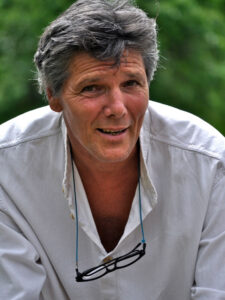 Éric Laudière is a practitioner and trainer in the field of psychogenealogy and family constellations.
Éric Laudière is a practitioner and trainer in the field of psychogenealogy and family constellations. Julia
Julia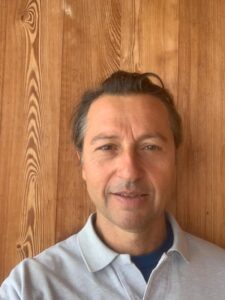 As a visceral and digestive surgeon, Pascal is accustomed to caring for others, but when he reached his forties, he faced his own health challenges.
As a visceral and digestive surgeon, Pascal is accustomed to caring for others, but when he reached his forties, he faced his own health challenges. Géraldine Rincheval discovered Yoga 16 years ago, during her first pregnancy. This decisive moment marked the beginning of a deep relationship with Yoga, a discipline that has accompanied her throughout her life.
Géraldine Rincheval discovered Yoga 16 years ago, during her first pregnancy. This decisive moment marked the beginning of a deep relationship with Yoga, a discipline that has accompanied her throughout her life. 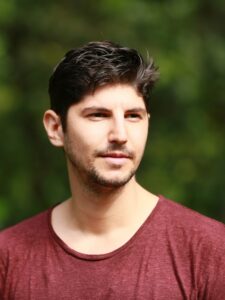 Osteopath and Trainer. Charbel helps therapists make their activities profitable, financially, on the effectiveness of their treatments and on their personal development.
Osteopath and Trainer. Charbel helps therapists make their activities profitable, financially, on the effectiveness of their treatments and on their personal development. 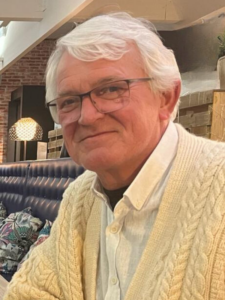 Philippe Pire has been a physiotherapist and osteopath based in Brussels for 38 years.
Philippe Pire has been a physiotherapist and osteopath based in Brussels for 38 years.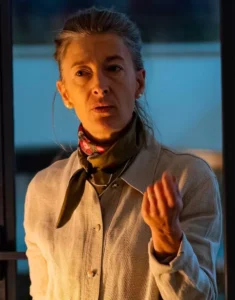 After a diploma in History and the Art Market, and nearly 15 years as a sales manager in the tertiary sector, Sabine completed a CAP in cooking and worked in several restaurants, including 1 Michelin star.
After a diploma in History and the Art Market, and nearly 15 years as a sales manager in the tertiary sector, Sabine completed a CAP in cooking and worked in several restaurants, including 1 Michelin star. André, a Mezierist physiotherapist, has long had a spiritual quest to enlighten his path.
André, a Mezierist physiotherapist, has long had a spiritual quest to enlighten his path.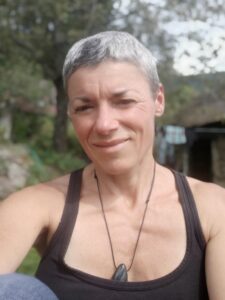 Valérie encountered yoga in 2007 and without her teachers clearly suggesting it, she was immediately sensitive to the practice of breathing and in particular Ujjuyi. Also, when she discovered the teachings of Marc Beuvain in 2015, she was deeply touched by his pedagogy and his approach. She was thus able to clearly understand that breathing was a key to the practice.
Valérie encountered yoga in 2007 and without her teachers clearly suggesting it, she was immediately sensitive to the practice of breathing and in particular Ujjuyi. Also, when she discovered the teachings of Marc Beuvain in 2015, she was deeply touched by his pedagogy and his approach. She was thus able to clearly understand that breathing was a key to the practice. I am a father of two little girls. I am 47 years old living in Brussels and working in the digital field.
I am a father of two little girls. I am 47 years old living in Brussels and working in the digital field. A pharmacist by training, Julie is interested in health and well-being in general.
A pharmacist by training, Julie is interested in health and well-being in general.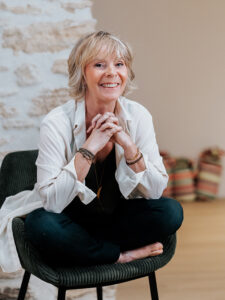 A former high-level athlete, Valérie encountered yoga in 1999 when she was looking for a physical activity devoid of competition and judgment while being passionate about subjects around personal development.
A former high-level athlete, Valérie encountered yoga in 1999 when she was looking for a physical activity devoid of competition and judgment while being passionate about subjects around personal development. Julie has always been interested in health. She obtained a doctorate in Biology in 2011 and was interested in various human pathologies such as Tuberculosis and Malaria.
Julie has always been interested in health. She obtained a doctorate in Biology in 2011 and was interested in various human pathologies such as Tuberculosis and Malaria.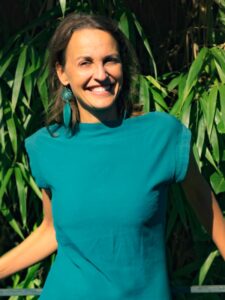 Frédérique has always been interested in health, wellness and natural therapies.
Frédérique has always been interested in health, wellness and natural therapies. Céline has been practicing yoga since 2008. She underwent initial teaching training between 2015 and 2019, began teaching and, at the same time, crossed paths with Marc Beuvain during a conference in Paris. Marc's vision of yoga challenges her, provokes her and touches her deeply. The first seeds are sown…
Céline has been practicing yoga since 2008. She underwent initial teaching training between 2015 and 2019, began teaching and, at the same time, crossed paths with Marc Beuvain during a conference in Paris. Marc's vision of yoga challenges her, provokes her and touches her deeply. The first seeds are sown…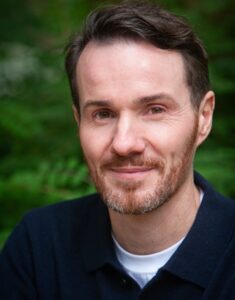 Marc Beuvain has been teaching Yoga for 26 years in France, but also in London, Milan, and Brussels in particular.
Marc Beuvain has been teaching Yoga for 26 years in France, but also in London, Milan, and Brussels in particular.

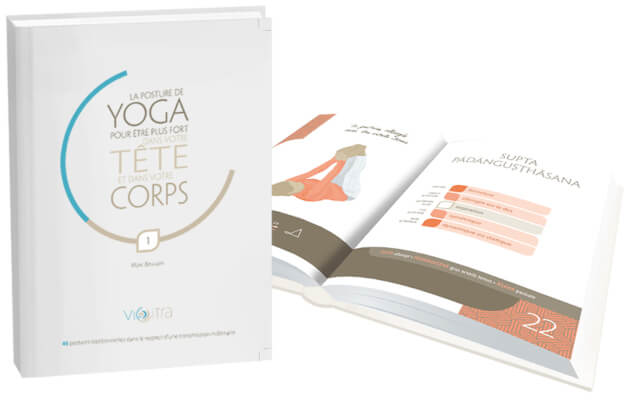
Post a comment
You must be logged in to post a comment.